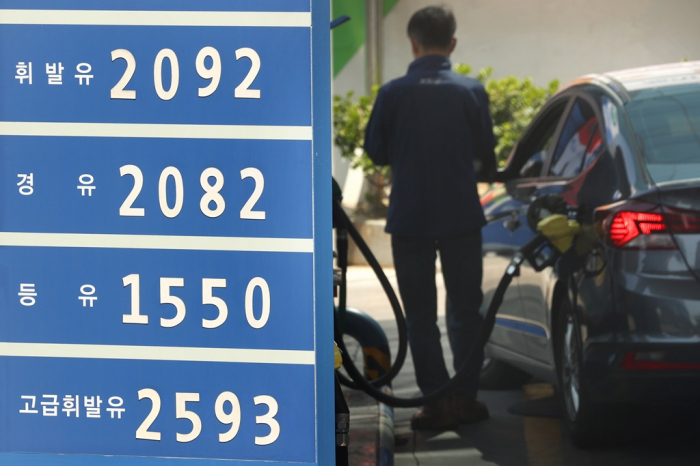
A gas station in Seoul. South Korea’s consumer prices surged 4.1% last month from a year earlier, the largest growth since December 2011. Prices of petroleum products jumped 31.2% on-year with global energy prices soaring amid the war in Ukraine South Korea’s consumer prices in March grew at the fastest pace in more than 10 years on surging energy and commodity prices, while the central bank predicted inflation this year may exceed its earlier forecast, adding to expectations for further interest rate hikes.The government bond yields surged with the highly liquid three-year debt yield at a near eight-year peak on views that the US Federal Reserve is predicted to aggressively tighten its monetary policy. South Korea’s President-elect Yoon Suk-yeol is also seeking an extra budget, adding to upward pressure on the yields.Consumer prices in Asia’s fourth-largest economy surged 4.1% last month from a year earlier, the largest growth since December 2011, government data showed on Tuesday. Prices of petroleum products jumped 31.2% on-year with global energy prices soaring amid the war in Ukraine.After the data was released, the Bank of Korea said this year’s inflation may top its earlier forecast of 3.1%, the highest since 2011, as the growth in consumer prices is likely to stay above 4% for the time being.“A higher rate of inflation could continue for a considerable period due to the Ukraine crisis,” said BOK Deputy Governor Lee Hwan-seok. “Upside risk to accelerating inflation has increased since February’s forecast.”The government decided to expand the tax cut on oil products by 30% from the current 20% for three months to ease the impact of soaring energy prices due to Russia’s invasion of Ukraine, the finance ministry said.HIGH BOND YIELDSThe country’s government bond yields on Monday surged as the BOK is expected to raise interest rates further.The highly liquid three-year government bond yield rose 5.3 basis points (bps) to close the local trade at 2.837%, the highest since June 9, 2014, according to the Korea Financial Investment Association.The five-year yield grew 7.7 bps to 3.019%, while yields for the 10-year and 30-year grew 5.8 bps and 13.6 bps to 3.065% and 3.02%, respectively.The BOK stepped in the market on Tuesday, buying 2 trillion won ($1.65 billion) worth of government bonds. The purchases pushed down the yields.GLOBAL FIGHT AGAINST INFLATIONDespite the effort, bond yields are expected to stay high as central banks around the world are in a fight against inflation.The Fed was expected to raise the interest rate by even 50 bps in May as US Labor Department’s data showed on April 1 that the unemployment rate dropped last month dropped to 3.6%, the lowest since February 2020 with 431,000 jobs added.BOK Governor nominee Rhee Chang-yong also indicated further monetary policy tightening. Bank of Korea Governor nominee Rhee Chang-yong speaks to reporters on April 1, 2022 Earlier this month, Rhee said he will use interest rates to tackle household debt that is rapidly increasing and its quality is deteriorating, hurting the nation's economic fundamentals.Some predicted the BOK may raise the base interest rate in a policy meeting next week even though Rhee may not be able to attend due to the parliamentary hearing to confirm his appointment.In addition, South Korea’s incoming administration is seeking a supplementary budget of 50 trillion won to support small companies and the self-employed hit by COVID-19, pushing up bond yields. The government is expected to issue deficit bonds to fund the budget, souring bond market sentiment.“Uncertainties grew in the market since the 50-trillion-won extra budget has yet to be confirmed,” said HI Investment & Securities’ chief economist Park Sang-hyun.By Mi-Hyun Jomwise@hankyung.comJongwoo Cheon edited this article.
Most Read